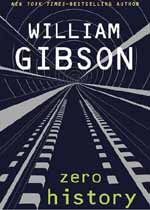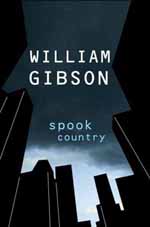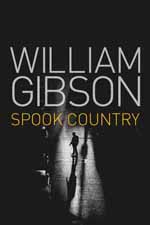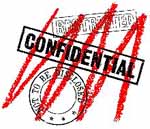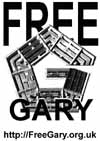At last, the tardy UK mainstream media are starting to notice the publication of William Gibson's Spook Country
Here is another positive review, this time from The Times by Peter Millar who reviews thrillers for The Times, and is well qualified to comment on the spooky intelligence protocols etc.
"Peter Millar is a British journalist and author, primarily known for his reporting of the fall of the Cold War and fall of the Berlin Wall for The Sunday Times of London."
The Times August 11, 2007Spook Country
By William Gibson.If this seems less futuristic than his previous novels, it’s us moving forward, not him moving back
Reviewed by Peter Millar
THE PRESENT IS A FOREIGN country. We do things differently here.A long time ago, in a parallel universe, I interviewed the psychopathic Ulster Loyalist hitman Billy Wright. I got in touch by writing him a letter – snail mail – to an address where he no longer lived. We met by an anonymous roadhouse and he took me in a car that he didn’t own to a house where he wouldn’t be spending the night. He said that if he stayed still for too long they would track him down and finish him off. He was right. When he was finally put in the Maze prison he was shot three times in the head by nationalist inmates.
Billy Wright (loyalist) (i.e. terrorist and criminal) entry in Wikipedia.
Bobby Chombo, the elusive key figure in William Gibson’s Spook Country, has the same sort of rational phobia, but updated: he refuses to spend two nights in the same square of a world divided up by the GPS (Global Positioning System) grid.
Dictators who fear assassination by their inner circle or other enemies also tend to sleep at a different location every night e.g. Saddam Hussein or his hero Joseph Stalin.
If you don’t know what the GPS grid is, stop here. You have never read a Gibson book and there is no point in even thinking about it. He doesn’t take prisoners, he shoots them. If he isn’t talking the language of today, he’s inventing tomorrow’s.Take a deep breath and remember that this is the man who coined the phrase “cyberspace” w-a-a-a-y back in 1982, years before the world wide web had been invented or anyone outside an obscure nuclear research laboratory in Switzerland had heard of it.
Technically, the World Wide Web did not crystallise until 1991, when Sir Tim Berners-Lee and his colleagues at Conseil Européen pour la Recherche Nucléaire (CERN) nuclear physics research laboratories on the Swiss / French border in Geneva, developed the first web browser and published the first web pages using the hypertext transport protocol (HTTP)
That was in a short story titled Burning Chrome that spawned a full-blooded novel named Neuromancer, which started out almost as science fiction but became a genre on its own – a genre that became a cult, which other people called cyberpunk.Reading Gibson in the Eighties was the literary equivalent of Ridley Scott’s big screen imaginings – the junk space freighter Nostromo in Alien or acid rain-soaked Los Angeles in Blade Runner – a world where technology and junk had intermingled, full of high-tech, low-life, silicon scavengers.
Gibson imagined an advanced internet on the cusp of sentience and christened it the “matrix” before the Wachowski brothers were out of their teens. The world of Neuromancer – and his next two novels, Count Zero and Mona Lisa Overdrive, which share it – is dominated by globalism, big corporations and street-hawkers in New Delhi, or Chiba City, Japan, selling hacked software or reconstituted hardware.
In these novels, collectively the Sprawl trilogy, “virtual reality” is the medium of the moment, and cyberspace is somewhere that you can upload yourself into.
In an afterword to the 2000 edition of Neuromancer, the author Jack Womack speculated that the way Gibson had described the evolution of an internet had influenced the real thing: “What if the act of writing it down, in fact, brought it about?”
So back in the here and now – wherever that is – we find Gibson promoting Spook Country in the online role-playing game Second Life, the closest thing yet to the virtual world inhabited permanently by the brain of Bobby Newmark in Mona Lisa Overdrive.
Of course, nothing has evolved exactly as Gibson didn’t predict – he would insist that he was writing fiction, not futurology; the world has “canted” (to use a Gibson word) in an oblique direction. And Gibson has canted with it, the future tense of his fiction fading into a high-speed cruise along the cutting edge of the curve that the rest of us are struggling to keep up with. In his own words: “The future is here already; it just isn’t evenly distributed.”
Which takes us back to Bobby Chombo avoiding satellite scanners in the warehouse that passes for his bedroom and in demand as an engineer for “locative artists” who specialise in virtual location sculpture. Google it and you will find that “locative art”, still in its infancy, features things such as maps of New York linked to sounds of the city, or performances involving mobile phones.
Another example of a reviewer using Google to check out some details from William Gibson's book. The literary world has been changed forever.
In Spook Country we have the actor River Phoenix, complete with hair dyed dark for his last role, recreated in the spot outside the Viper Room in Hollywood where he died, but visible only if you wear a virtual reality helmet, or carry a laptop.Bobby’s expertise with computer servers means that he can trace global shipping containers – the sort that interest a man called Brown who may or may not have government connections and who keeps Milgrim, a pharmaceutical pill junkie, in tow because he can read Volapuk.
As you will know, Volapuk is the text-language used by Russians to express Cyrillic script on telephones with only Latin letters.
Very few non-Russian mobile phone users will have heard of this, before reading Spook Country.
There is a difference between Volapuk encoding for overcoming the Cyrillic to ASCII mobile phone and computer keyboard problem, and the older Volapük constructed language, a precursor to Esperanto
It is being used by Tito (named after the Yugoslav dictator?), a Chinese-Cuban refugee with a family that extends from Havana to New York and a mystical belief in the hybrid Catholic-Voodoo gods known as orishas. Complex ethnicity – exact in excruciating detail – is a Gibson trademark.Regular Gibson readers will welcome back the sinister mega-rich Belgian global PR executive Hubertus Bigend and greet the rock star turned journalist Hollis Henry, left over from a cult band named the Curfew.
Hubertus Bigend Wikipedia article (quoting the fictional Wikipedia entry which William Gibson has written into Spook Country)
In the Bridge trilogy – Idoru, Virtual Light and All Tomorrow’s Parties (a title taken from a Velvet Underground song) – Gibson moved towards today as today moved towards him. Pattern Recognition was set in that today with its heroine’s almost allergic hypersensitivity to brand names.Spook Country ties in thriller themes that writers who have never toyed with speculative fiction would recognise – Iraq, corruption, shipping piracy – but the codes are hidden on iPods instead of in microdots.
On his website, in the autobiographical section that he calls “source code”, Gibson quotes the veteran American sci-fi writer Gene Wolfe: “Being an only child whose parents are dead is like being the sole survivor of drowned Atlantis. There was a whole civilisation there, a whole continent but it’s gone. And you alone remember.”
Gibson has created his own civilisation to compensate. And over time – depending on the speed of your own universe – the rest of us have come to inhabit it. Welcome home.
SPOOK COUNTRY by William Gibson
Viking, £18.99; 371pp
Buy the book here for the offer price of £17.09 (free p&p)
William Gibson is at the Edinburgh International Book Festival on Monday August 27 at 7pm. Call 0845 373 5888 www.edbookfest.co.uk
Another positive review, this time, at last, in a major United Kingdom publication.
